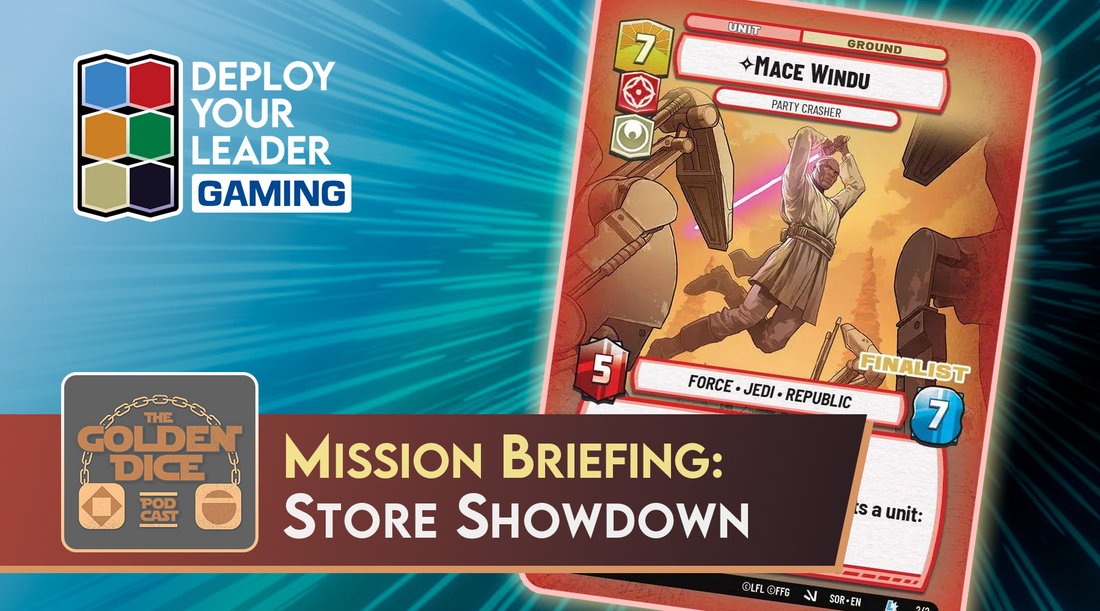Hello everyone and welcome back to another installment of our Mission Briefing series. I am ScottE of the Golden Dice Podcast, and I am going to be taking you through how to prep and prepare yourself for what is currently the penultimate event available for Star Wars Unlimited FFG Organized Play (“OP”): the illustrious Store Showdown. Insert crowd roar.

Maybe you’re new to TCGs. Or maybe you’re new to tournaments. Maybe you’ve had some disappointing tournament results; regardless I, ScottE, have you covered.
But ScottE, what’s a Store Showdown?
I’m glad you asked. Store Showdowns are events that FFG are supporting stores in putting on once per set with specific promos up as prizing for the events. These promos are going to be given out as participation and placement prizing. They are the highest level of what FFG classifies as “Casual Play” within their OP structure.

Right now, as FFG is ramping up the OP, Store Showdowns are the highest level of officially sponsored FFG events. Because they are still Casual Play tier, there are going to be a lot of them run. (Stores essentially only have to meet a minimum product order amount to be eligible to host one).
There is going to be a ton of variety in how these events sort out, as FFG leaves that in the hands of the store.
So that leads us to our first tip of the article.
Know the event you are signing up for.
Because FFG is leaving the structure of the event up to the stores, for better or worse, you’re going to see a lot of variety in these events.
- Weekday vs Weekend?
- Top 8? Top 4? No top cut?
- Decklists required? Decklists as open information?
- Best of 3 vs Best of 1?
We are going to probably see it all this first Store Showdown season.
That means it’s important for you as a player to check with the stores running these events to see exactly how it is going to be structured. You want to make sure you are going to events that suits your expectations as a player.

Because the bar for hosting these events is fairly low, there may also be a number of showdowns in your area, and they could all be run differently. So make sure you know what you are getting into ahead of time.
But what should you bring to play in the event? Glad you asked.
Deck Choice
Bring something you enjoy playing.
This is still a Casual Play level event. No one is paying the rent with their winning from a 16 person Store Showdown.
If you don’t like playing a given deck, you probably aren’t going to be fully dialed in with it, and your performance will likely suffer.
Bring something you have experience playing.
Unless your go-to deck is IG-88 Aggression, you’re probably going to do better with a deck you’ve played before rather than one you’ve never touched.

Do not bring a control deck if you don’t have practice with it. Casual Play or not, this is still a tournament with timed rounds. Control decks make games go more turns. More turns means games take longer.
If you bring a control deck that you aren’t at least somewhat practiced with, you will be at high risk of going to time in at least one if not multiple rounds. If the round ends with no winner, you both get a loss. That doesn’t benefit you or your opponent, so do you both this favor.
Local meta beats overall meta
Meta (or metagame) is the game about a game. It’s about what’s popular and what’s performing well within the game overall.
We live in a time where you can see tournament results and decklists from events across the world in near real time. This has resulted in metas being more homogenized across the board.
But local metas still exist. If you are attending a Store Showdown at your regular weekly play venue, what is popular at that store matters more than event results half the world away.
But while the local meta (if you are aware of it) should inform your deck choice the most, don’t ignore information from other events entirely. Yeah, you may know locally everyone loves Sabine, but that doesn’t mean you aren’t going to see some shift towards other decks because of other event results elsewhere.

Test your deck with intention
Test against what you expect to be there. If you know the local meta, leverage that. If you don’t, leverage the general meta.
If your goal is to win the event, you are going to get way less out of testing against a jank deck that likely won’t be there vs the known and quantified decks that will be.
You don’t want to set yourself up for failure by having goals and then not matching your effort to your goals. I mean we all do it with various things in our lives, but it’s always best to avoid it when possible. So test against appropriately competitive decks.
So you now know what you’re playing, but this might be your first event outside of the Monday night, 3-rounds casual you make every other week as work permits. What should you do to set yourself up to have an enjoyable and successful event?
Event Preparation
I used to have an awful habit of not deciding what I was playing until the day of. the event. I may have passed that habit onto (Golden Dice teammate) Jack, but take it from me you – don’t want to be like Jack.
Have your deck set the night before. Not just your main deck but your sideboard also.
Make sure the cards you want in your deck are actually physically in your deck. While it’s a Casual Play event, stores may still have you submit decklists. The last thing you want is to have cards in your deck that are not on your list (cough, GDP Brian, cough).
That's just not a good situation to be in, and it's not fun for the Judge/TO to have to adjudicate. It’s best to avoid being *that guy*.
While you’re making sure your deck matches what you want your deck to be, give your sleeves a good look. Sleeves wear over time, and sometimes they do so in a not quite uniform manner. When comparing your main deck sleeves to your sideboard sleeves, it’s fairly common for the former to wear more than the latter. This could result in your deck possibly having marked cards, which is a major tournament violation whether purposeful or not.
While Store Showdowns are Causal Play and the likelihood of a deck check is low, it’s still best practice to inspect your sleeves before these types of events to avoid any issues. Best to build good habits now that will carry on once Competitive Play events start.
Another area to consider is that these Store Showdowns, depending on player count and size of the Top Cut, could be substantially longer affairs then any weekly event you’ve gone to.

You could be there all day and – unless you’re playing Sabine – you might not have much of a break between rounds depending on the timing and how long your games take. That’s why it’s really important to bring some food and drink with you to the event. Nobody plays well while they are hangry (cough Brian cough), and if you’re going to a new store you’ve never been to, there may or may not be suitable food choices available for you to snag between rounds. The length of time you may be playing is likely to be the biggest difference between these Store Showdowns and weekly events you may be used to, so staving off fatigue is very important.
One Final Reminder
Ultimately, just remember these Store Showdowns are still Casual Play events. If you perform below expectations there’s probably another one you could give a go next week.
But if you want to increase your odds of having a successful and enjoyable day listen to a few of the things I typed above. Thank you for sticking with me through this whole spiel, I really appreciate it.
Now throw your deck box, a protein bar, and some water in your bag and go take down a Store Showdown to earn those sweet Mace promos!





